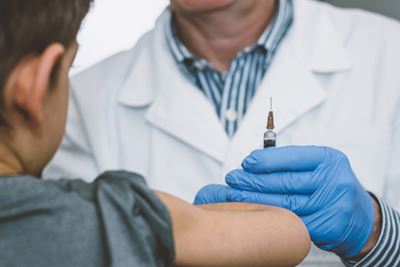It’s shaping up to be a rough flu season, but it’s not too late to protect your family.
Flu season is here, and it is packing a big punch this year. In late December and early January, experts documented a surge of influenza illnesses throughout various parts of the country, and Florida is no exception. Experts predict this trend to continue for the next several months, and here’s why:
- Transmission of the virus was likely boosted by holiday travel and gatherings.
- The prevalent flu strain H3N2 has proven to be severe in the past.
- The flu vaccine is showing lower effectiveness rates than we’d hoped.
Many more people will become sick from the flu this year than in previous years, and when they do contract the illness, it may be a severe course with an increased likelihood of complications.
Is it too late to protect against the flu?
 As we’ve shared many times before, the best way to protect yourself and your family from the flu is to get a flu shot. A lot of people may think, however, that given the reasons listed above, there’s really nothing we can do to fight the flu. The thinking goes, “If the flu vaccine isn’t very effective this year, why should I even bother to get it? I’ll just take my chances.”
As we’ve shared many times before, the best way to protect yourself and your family from the flu is to get a flu shot. A lot of people may think, however, that given the reasons listed above, there’s really nothing we can do to fight the flu. The thinking goes, “If the flu vaccine isn’t very effective this year, why should I even bother to get it? I’ll just take my chances.”
Here’s the thing. The flu is not something we can take chances with. It can be a life or death issue, and that isn’t to be taken lightly. It’s true that many of us who get the flu will simply feel miserable for a week or so, but there are many people for whom the stakes are much higher.
The very young, the very old, people with chronic diseases and pregnant and postpartum women can suffer very serious, life-threatening complications. Here in Florida, there have already been two pediatric deaths confirmed from the illness, and we are still very early in the season. Last year more than 100 children nationwide died from this illness. Even healthy people can suffer life-threatening complications, and we can’t predict which healthy people will experience this. It could be you or someone in your family.
Here’s the other thing. Even when the flu vaccine doesn’t prevent us from getting the flu virus, it still protects us! People who’ve gotten the vaccine and get the flu get better quicker and tend to have less complications. In other words, even though the vaccine didn’t keep you completely out of the fight, it’s still backing you up and helping your body win the fight once you’re in it.
What you can do to avoid the flu.
- Everyone 6 months of age and older should get the flu shot. There are very few exceptions to this recommendation. If you or your children haven’t gotten one yet, go get it immediately.
- If you’re concerned about getting the flu shot, talk to your doctor about these concerns.
- Avoid contact with sick people.
 Wash your hands with soap and water frequently, and use hand sanitizer when handwashing isn’t possible. Don’t use antibacterial soap, and be sure to wash for 10 to 15 seconds. For kids, have them sing their A-B-C’s while they wash to be sure they’re washing long enough.
Wash your hands with soap and water frequently, and use hand sanitizer when handwashing isn’t possible. Don’t use antibacterial soap, and be sure to wash for 10 to 15 seconds. For kids, have them sing their A-B-C’s while they wash to be sure they’re washing long enough.
- People who are sick should stay home and avoid contact with others until they are fever-free for at least 24 hours (without the help of fever-reducing medication).
- Be sure your childcare facility is doing all it should to protect your child from the flu.
If you or anyone in your family experiences symptoms of the flu- fever, body aches, chills, sore throat, cough, congestion, runny nose, headaches, fatigue, (diarrhea and vomiting sometimes occur but this is more common in children)- see your doctor right away for a flu test.
If you do have the flu, antiviral medications can shorten the course of your illness and often prevent complications. This is especially important in young children and those at high risk of complications. Antiviral medications are often given to otherwise healthy people as well if they or someone in their family is sick with the flu. These medications are much more effective if given within 48 hours of the first symptoms, so get to your doctor’s office as soon as possible if you experience the symptoms listed above.
Request an Appointment
Visit us online to request an appointment. Upon completion of this form, a representative will contact you within 48 hours to confirm your actual appointment date and time.










